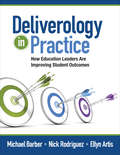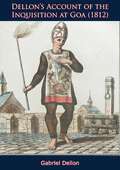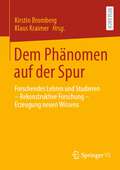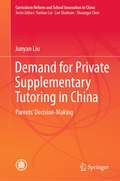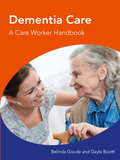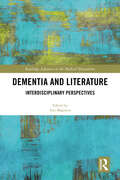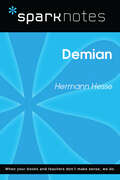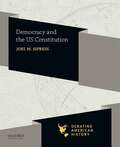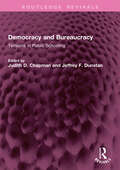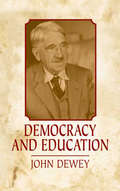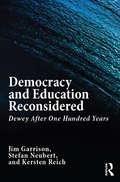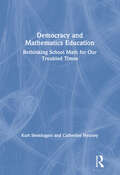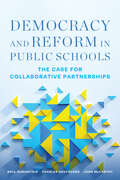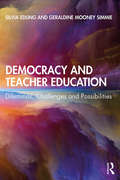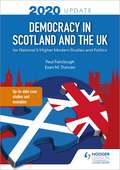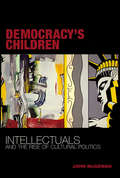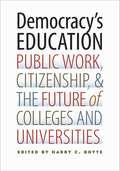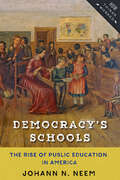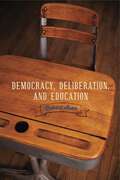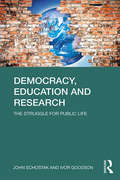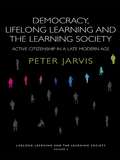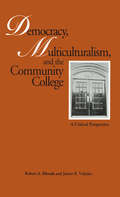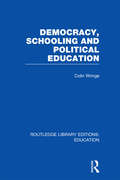- Table View
- List View
Deliverology in Practice: How Education Leaders Are Improving Student Outcomes
by Michael Barber Nickolas C. Rodriguez Ellyn ArtisEverything you need to implement school change that gets results! If you’ve been wondering how to effectively lead and manage results-driven, system-wide implementations, look no further. Internationally recognized education expert Michael Barber explores exactly how to translate policy into practice for long-term, measurable results. Building on his groundbreaking book, Deliverology 101, Barber provides proven methods and clear steps to achieve successful policy implementation and offer practical solutions for reviving stalled reform efforts. New cases studies and embedded links help you develop a delivery "skillset" for building capacity, effective coalitions, and a coherent, flexible plan for implementation. Leaders and staff at both national and local levels will learn to: Establish a Delivery Unit to set clear, measureable goals and build a reform coalition Understand delivery through data analysis and strategic progress monitoring Plan for delivery with explicit, day-to-day implementation planning updated with proven methods from years of practice Drive delivery with progress monitoring, momentum building, and course corrections Create an irreversible delivery culture by identifying and addressing challenges as they occur Don’t leave your education policy implementation to chance. Use this new field guide to get your implementation on the right track today!
Dellon's Account of the Inquisition at Goa (1812)
by Gabriel DellonDellon (1649-1709) was a French Roman Catholic physician who traveled in the Indies. In 1673 he provoked the jealousy of the Governor of Damao who, in league with authorities of the Portuguese Inquisition, arrested him and had him transported to Goa to face the Inquisitor. After two years of torture the Inquisition, deaf to Dellon’s pleas, confiscated all of his property and sentenced him to serve five years on the galleys. However, on arrival in Lisbon Dellon reopened and pleaded his case before the Grand Tribunal, who granted him his freedom. Even Catholic France—as evidenced by the King’s approval—became indignant at Inquisitional methods in this case. Dellon’s anonymous account of his misfortunes became very popular, and ran to many editions despite being placed on the Index of Prohibited Books in 1690. The first edition was published in Leiden in 1687, with no illustrations. The three full-page plates depict penitents accused of different crimes in their official regalia; the three folding plates illustrate the procession of the Inquisition into a church, the Inquisition in session within the church, and penitents being led from the church to be burned at the stake. Also with three engraved in-text vignettes and engraved printer’s mark on title page.
Dem Phänomen auf der Spur: Forschendes Lehren und Studieren – Rekonstruktive Forschung – Erzeugung neuen Wissens
by Kirstin Bromberg Klaus KraimerDas Buch zeigt auf, wie wissenschafts- und forschungsorientierte Partizipation, Qualifizierung und Weiterbildung realisiert werden kann. Es vermittelt, wie Verstehen methodisch angeleitet werden muss, wenn nicht schematisch zugeordnet und gehandelt, sondern professionell agiert werden soll. Der Band vereint daher Beiträge, die Phänomenen auf der Spur sind, die erhellende, verblüffende oder ernüchternde Schlüsse ziehen und die auf vergessene sowie neue Zusammenhänge hinweisen. Hierüber wecken die Beiträge Interesse an der Entdeckung des Neuen, an Spurensuche, an Phänomenen des Biografischen, des Sozialen und des Pädagogischen.
Demand for Private Supplementary Tutoring in China: Parents' Decision-Making (Curriculum Reform and School Innovation in China)
by Junyan LiuThis book combines the ideologies of parentocracy and consumer theory as theoretical lenses to view the private supplementary tutoring, also known as shadow education, with a focus on the demand at primary and lower secondary levels in China. It first explains parents’ motivations of seeking private tutoring and their decision-making dynamics, and then explores the evolving micro-level process of demand that has changed over time. It further investigates how demand for private tutoring varies across parental socioeconomic status. This book also discusses parents’ attitudes towards the Double Reduction policy and corresponding changes in their demand for tutoring. It concludes with some implications for regulating private tutoring and for improving school education. This book has pertinence in other countries as well as in China. Unpacking the demand for tutoring improves understanding of the global expansion and changing shapes of the phenomenon.Researchers, educational policy-makers, teachers, tutors, consultants, and other educational practitioners interested in the topic of private tutoring will find this work thought-provoking, instructive and informative.
Dementia Care A Care Worker Handbook
by Belinda Goode Gayle BoothWorking with people with dementia? Training in adult or dementia care? You don't have to go it alone!Caring for people with dementia is one of the most challenging and rewarding roles in Health and Social Care. But with a range of awards, certificates and pathways for work-based learners it can be a confusing area for qualifications. That's why we've put together a one-stop handbook to support your training and continuing professional development in demential care.Here in one place is all the topic knowledge, assessment support and practical advice you will need for a range of dementia care qualifications. Core topics are linked to the specific learning and assessment objectives you need to cover for 16 QCF dementia units. Case studies tie learning into the many different settings and roles across Home Care, Residential Care, NHS and Private Settings.This book is especially useful for candidates taking the: Level 2 Award or Certificate in Awareness of Dementia Level 3 Award or Certificate in Awareness of Dementia Level 2 Diploma Health and Social Care Dementia Pathway Level 3 Diploma Health and Social Care Dementia Pathway.It's also a must have reference for those who want to brush up skills and knowledge from previous qualifications.So whatever your level of specialism, give yourself the tools you need to survive and even flourish in dementia care.
Dementia and Literature: Interdisciplinary Perspectives (Routledge Advances in the Medical Humanities)
by Tess MaginessDementia is an urgent global concern, often termed a widespread ‘problem’, ‘tragedy’ or ‘burden’ and a subject best addressed by health and social policy and practice. However, creative writers can offer powerful and imaginative insights into the experience of dementia across cultures and over time. This cross-disciplinary volume explores how engaging with dementia through its myriad literary representations can help to deepen and humanise attitudes to people living with the condition. Offering and interrogating a wide array of perspectives about how dementia might be ‘imagined’, this book allows us to see how different ways of being can inflect one another. By drawing on the ‘lived’ experience of the individual unique person and their loved ones, literature can contribute to a deeper and more compassionate and more liberating attitude to a phenomenon that is both natural and unnatural. Novels, plays and stories reveal a rich panoply of responses ranging from the tragic to the comic, allowing us to understand that people with dementia often offer us models of humour, courage and resilience, and carers can also embody a range of responses from rigidity to compassion. Dementia and Literature problematises the subject of dementia, encouraging us all to question our own hegemonies critically and creatively. Drawing on literary studies, cultural studies, education, clinical psychology, psychiatry, nursing and gerontology, this book is a fascinating contribution to the emerging area of the medical and health humanities. The book will be of interest to those living with dementia and their caregivers as well as to the academic community and policy makers.
Demian (SparkNotes Literature Guide Series)
by SparkNotesDemian (SparkNotes Literature Guide) by Hermann Hesse Making the reading experience fun! Created by Harvard students for students everywhere, SparkNotes is a new breed of study guide: smarter, better, faster.Geared to what today's students need to know, SparkNotes provides:chapter-by-chapter analysis explanations of key themes, motifs, and symbols a review quiz and essay topics Lively and accessible, these guides are perfect for late-night studying and writing papers.
Democracy And The Us Constitution (Debating American History Ser.)
by Joel M. Sipress David J. VoelkerEmbracing an argument-based model for teaching history, the Debating American History series encourages students to participate in a contested, evidence-based discourse about the human past. Each book poses a question that historians debate--How democratic was the U.S. Constitution? or Why did civil war erupt in the United States in 1861?--and provides abundant primary sources so that students can make their own efforts at interpreting the evidence. They can then use that analysis to construct answers to the big question that frames the debate and argue in support of their position. Democracy and the US Constitution poses this big question: How democratic was the U.S. Constitution?
Democracy and Bureaucracy: Tensions in Public Schooling (Routledge Revivals)
by Judith D. Chapman Jeffrey F. DunstanFirst published in 1990, Democracy and Bureaucracy examines the tensions associated with the reorganization of public education in Australia. Contributors explore these tensions through a variety of related antimonies: bureaucracy and democracy, control and autonomy, centralism and devolution. The thesis generally propounded in this book is that democratic structures, participation and school-based decision-making are all elements of school improvement which enable a bureaucracy to be more responsive, less authoritarian, and in control only over the macro issues of policy, thereby leaving to schools the maximum degree of freedom possible for their own determination of principles, policies and practices. This book will be of interest to students of education, pedagogy, public policy and public administration.
Democracy and Education
by John DeweyPsychology, epistemology, ethics, and politics are among the subjects on which John Dewey focused his authorial talents — but the crux of his works lies in his philosophy of education. Democracy and Education, originally published in 1916, is his landmark work in the field and an ongoing source of influence and inspiration.Dewey blends his philosophical pragmatism and his progressive pedagogical ideas to define the social role of education and its significance as preparation for citizenship in a progressive democratic society. He stresses democracy's associational and communal aspects, maintaining that conscious, directed education is necessary to establish these conditions and to cultivate democratic character in students. Growth, experience, and activity are the factors Dewey employs to characterize the connection between learning and the variety of social, communicative activity that fosters a thriving democratic community.As a conclusion, the author addresses the social barriers that inhibit democratic education. These divisions, he finds, derive from the practice of dichotomizing relationships between the mind and body, the mind and nature, and the individual and society. Dewey promotes a philosophy of education that negates these dualisms and focuses on freedom of the mind through directed social activity.
Democracy and Education Reconsidered: Dewey After One Hundred Years
by Jim Garrison Kersten Reich Stefan NeubertDemocracy and Education Reconsidered highlights the continued relevance of John Dewey’s Democracy and Education while also examining the need to reconstruct and re-contextualize Dewey’s educational philosophy for our time. The authors propose ways of revising Dewey’s thought in light of the challenges facing contemporary education and society, and address other themes not touched upon heavily in Dewey’s work, such as racism, feminism, post-industrial capitalism, and liquid modernity. As a final component, the authors integrate Dewey’s philosophy with more recent trends in scholarship, including pragmatism, post-structuralism, and the works of other key philosophers and scholars.
Democracy and Mathematics Education: Rethinking School Math for Our Troubled Times
by Kurt Stemhagen Catherine HenneyIn Democracy and Mathematics Education, Kurt Stemhagen and Catherine Henney develop a way of thinking about the nature and purposes of math that is inclusive, participatory, and thoroughly human. They use these ideas to create a school mathematics experience that can enhance students’ math abilities and democratic potential. They locate mathematics’ origins in human activity and highlight the rich but often overlooked links between mathematical activity and democratic, social practices. Democratic mathematics education foregrounds student inquiry and brings to light the moral dimensions of a discipline that has both remarkable utility and inevitable limitations. For math educators, the book’s humanities approach helps to see the subject anew. For philosophers, it provides an important real world context for wrestling with perennial and timely questions, engaging democratic and evolutionary theory to transform school math. This alternative approach to mathematics and mathematics education provides a guide for how to use math to make democracy a larger part of school and wider social life.
Democracy and Reform in Public Schools: The Case for Collaborative Partnerships
by Charles Heckscher John McCarthy Saul RubinsteinA thought-provoking examination of how public education systems can be strengthened through strategic relationships both within schools and with outside partners. In Democracy and Reform in Public Schools, Saul Rubinstein, Charles Heckscher, and John McCarthy apply their expertise in labor relations to public school reform. They envision a model of K–12 education that shifts away from the tenets of neoliberalism and centers on productive collaboration among school boards, school administrators, teacher unions, and other education stakeholders. Providing evidence of the links between collaborative partnerships and improved student outcomes, Rubinstein, Heckscher, and McCarthy build on a rich body of research on interorganizational cooperation. They highlight case studies such as that of the New Jersey Public School Labor-Management Collaborative as leading examples of how better student performance, more intra-district learning and innovation, and reduced teacher turnover can be traced to greater educator collaboration. Citing examples not only from the K–12 educational sector but also from successful union–management partnerships in the automobile, steel, and telecommunications industries, they then identify proven strategies to foster collaborative partnerships at district, state, and national levels. They discuss techniques for forging new partnerships, sustaining collaborative efforts, and expanding the collaborative partnership model to larger scales. This work expertly demonstrates how employment relations practices are antecedents to whole-system reform in schools.
Democracy and Schooling in California
by Kathleen WeilerHelen Heffernan and Corinne Seeds were nationally recognized as leaders of the progressive education movement and were key figures in what was probably the most concerted attempt to put the ideals of progressive education into practice in a state-wide system of public education in the United States. This book examines the struggle over public education in mid-twentieth century America through the lens of a joint biography of these two extraordinary women, Heffernan, the California Commissioner of Rural and Elementary Education between 1926 and 1965, and Seeds, the Director of the University Elementary school at UCLA between 1925 and 1957.
Democracy and Teacher Education: Dilemmas, Challenges and Possibilities
by Geraldine Mooney Simmie Silvia EdlingThis book connects the dilemmas educators experience in daily practice with key theories, research and policy about democracy, ethics and equity in education. Illustrated through vignettes from practising teachers, as well as suggested questions and supplementary readings for each chapter, the authors recognise and explore the complex nature of the insoluble problems that face practising teachers in their everyday lives and how they can be understood in order to address them in a more elaborate manner. Divided into eight concise chapters, this book provides a much-needed comprehensive exploration of issues within the education discourse, as seen from a global perspective, such as: Teachers’ understanding of their profession Political demands and the complexities of practice Schools’ democratic values Performance and accountability Minority needs and majority rule Countering radicalisation, terrorism and misinformation. Democracy and Teacher Education is a fantastic resource for students in teacher education programmes, as well as teacher educators, who are looking to develop a critical understanding of the choices made within the education field in a more thoughtful and sensitive manner.
Democracy in Scotland and the UK 2020 Update: for National 5/Higher Modern Studies and Politics
by Paul Fairclough Euan M. DuncanEnsure that students understand recent issues and debates in Scotland and the UK - and know how to use these examples effectively in the National 5/Higher Modern Studies and Higher Politics exams.> Review the key developments in Scottish and UK politics in 2019, with expert analysis that supports revision, the assignments and the question papers> Consolidate understanding and practise for the exams with short knowledge-check questions at the end of every article> Easily see how each article links to the National 5/Higher Modern Studies and Higher Politics specifications so you know how and when to reference themTopics covered:> Citizens' Assemblies - Are they a good way to clear political logjams?> The Scottish Parliament - Is it a failing institution?> Extinction Rebellion - Do single-issue pressure groups undermine democracy?> Scottish electoral systems - Are they fit for purpose?> Brexit - Is it 'the UK's constitutional time-bomb'?> Education policy in Scotland - Addressing the attainment gap or widening it?> Independence for Scotland - Is it getting closer and what would it look like?> The 2019 General Election - Why did it happen and what did it tell us?
Democracy's Children: Intellectuals and the Rise of Cultural Politics
by John McGowanHow do American intellectuals try to achieve their political and social goals? By what means do they articulate their hopes for change? John McGowan seeks to identify the goals and strategies of contemporary humanistic intellectuals who strive to shape the politics and culture of their time. In a lively mix of personal reflection and shrewd analysis, McGowan visits the sites of intellectual activity (scholarly publications, professional conferences, the classroom, and the university) and considers the hazards of working within such institutional contexts to effect change outside the academy. Democracy's Children considers the historical trajectory that produced current intellectual practices. McGowan links the growing prestige of "culture" since 1800 to the growth of democracy and the obsession with modernity and explores how intellectuals became both custodians and creators of culture. Caught between fears of culture's irrelevance and dreams of its omnipotence, intellectuals pursue a cultural politics that aims for wide-ranging social transformations. For better or worse, McGowan says, the humanities are now tied to culture and to the university. The opportunities and frustrations attendant on this partnership resonate with the larger successes and failures of contemporary democratic societies. His purpose in this collection of essays is to illuminate the conditions under which intellectuals in a democracy work and at the same time to promote intellectual activities that further democratic ideals.
Democracy's Education: Public Work, Citizenship, and the Future of Colleges and Universities
by Harry C. BoyteToday Americans feel powerless in the face of problems on every front. Such feelings are acute in higher education, where educators are experiencing an avalanche of changes: cost cutting, new technologies, and demands that higher education be narrowly geared to the needs of today's workplace. College graduates face mounting debt and uncertain job prospects, and worry about a coarsening of the mass culture and the erosion of authentic human relationships. Higher education is increasingly seen, and often portrays itself, as a ticket to individual success--a private good, not a public one.Democracy's Education grows from the American Commonwealth Partnership, a year-long project to revitalize the democratic narrative of higher education that began with an invitation to Harry Boyte from the White House to put together a coalition aimed at strengthening higher education as a public good. The project was launched at the beginning of 2012 to mark the 150th anniversary of the Morrill Act, which created land grant colleges.Beginning with an essay by Harry C. Boyte, "Reinventing Citizenship as Public Work," which challenges educators and their partners to claim their power to shape the story of higher education and the civic careers of students, the collection brings world-famous scholars, senior government officials, and university presidents together with faculty, students, staff, community organizers, and intellectuals from across the United States and South Africa and Japan. Contributors describe many constructive responses to change already taking place in different kinds of institutions, and present cutting-edge ideas like "civic science," "civic studies," "citizen professionalism," and "citizen alumni." Authors detail practical approaches to making change, from new faculty and student roles to changes in curriculum and student life and strategies for everyday citizen empowerment. Overall, the work develops a democratic story of education urgently needed to address today's challenges, from climate change to growing inequality.
Democracy's Education: Public Work, Citizenship, and the Future of Colleges and Universities
by Harry C. BoyteToday Americans feel powerless in the face of problems on every front. Such feelings are acute in higher education, where educators are experiencing an avalanche of changes: cost cutting, new technologies, and demands that higher education be narrowly geared to the needs of today's workplace. College graduates face mounting debt and uncertain job prospects, and worry about a coarsening of the mass culture and the erosion of authentic human relationships. Higher education is increasingly seen, and often portrays itself, as a ticket to individual success--a private good, not a public one. Democracy's Education grows from the American Commonwealth Partnership, a year-long project to revitalize the democratic narrative of higher education that began with an invitation to Harry Boyte from the White House to put together a coalition aimed at strengthening higher education as a public good. The project was launched at the beginning of 2012 to mark the 150th anniversary of the Morrill Act, which created land grant colleges. Beginning with an essay by Harry C. Boyte, "Reinventing Citizenship as Public Work," which challenges educators and their partners to claim their power to shape the story of higher education and the civic careers of students, the collection brings world-famous scholars, senior government officials, and university presidents together with faculty, students, staff, community organizers, and intellectuals from across the United States and South Africa and Japan. Contributors describe many constructive responses to change already taking place in different kinds of institutions, and present cutting-edge ideas like "civic science," "civic studies," "citizen professionalism," and "citizen alumni." Authors detail practical approaches to making change, from new faculty and student roles to changes in curriculum and student life and strategies for everyday citizen empowerment. Overall, the work develops a democratic story of education urgently needed to address today's challenges, from climate change to growing inequality.
Democracy's Schools: The Rise of Public Education in America (How Things Worked)
by Johann N. NeemThe unknown history of American public education.At a time when Americans are debating the future of public education, Johann N. Neem tells the inspiring story of how and why Americans built a robust public school system in the decades between the Revolution and the Civil War. It’s a story in which ordinary people in towns across the country worked together to form districts and build schoolhouses and reformers sought to expand tax support and give every child a liberal education. By the time of the Civil War, most northern states had made common schools free, and many southern states were heading in the same direction. Americans made schooling a public good.Yet back then, like today, Americans disagreed over the kind of education needed, who should pay for it, and how schools should be governed. Neem explores the history and meaning of these disagreements. As Americans debated, teachers and students went about the daily work of teaching and learning. Neem takes us into the classrooms of yore so that we may experience public schools from the perspective of the people whose daily lives were most affected by them.Ultimately, Neem concludes, public schools encouraged a diverse people to see themselves as one nation. By studying the origins of America’s public schools, Neem urges us to focus on the defining features of democratic education: promoting equality, nurturing human beings, preparing citizens, and fostering civic solidarity.
Democracy, Deliberation, and Education (Rhetoric and Democratic Deliberation #13)
by Robert AsenThe local school board is one of America’s enduring venues of lay democracy at work. In Democracy, Deliberation, and Education, Robert Asen takes the pulse of this democratic exemplar through an in-depth study of three local school boards in Wisconsin. In so doing, Asen identifies the broader democratic ideal in the most parochial of American settings. Conducted over two years across racial, ethnic, and socioeconomic lines, Asen’s research reveals as much about the possibilities and pitfalls of local democracy as it does about educational policy. From issues as old as racial integration and as contemporary as the recognition of the Gay-Straight Alliance in high schools, Democracy, Deliberation, and Education illustrates how ordinary folks build and sustain their vision for a community and its future through consequential public decision making.For all the research on school boards conducted in recent years, no other project so directly addresses school boards as deliberative policymaking bodies. Democracy, Deliberation, and Education draws from 250 school-board meetings and 31 interviews with board members and administrators to offer insight into participants’ varied understandings of their roles in the complex mechanism of governance.
Democracy, Education and Research: The Struggle for Public Life
by John Schostak Ivor F. GoodsonConsidering how practices and processes of research and education can create fundamental, radical social change, Democracy, Education and Research assesses the meaning of ‘public impact‘ by rethinking what is meant by ‘public‘ and how it is essential to the methodologies of education and research. Focusing on empirical illustrations of the use of research and educational processes in contemporary and emergent forms of social organisation, this book: Covers the traditional forms to be found in education, health systems, community, business and public institutions, as well as emergent forms arising from innnovation in technologies. Explores the forms of learning and knowledge creation that take place across the everyday interactions in places of learning, communities or workplaces Discusses how learning and knowledge can be intentionally shaped by individuals and groups to effect social and political change Considers the research strategies required to forge new practices, new ways of working and living for a more socially just world Including practical examples of research that has created real change, Democracy, Education and Research will be a vital resource to professional researchers in their roles as teachers, educators and activists as well as students of education, sociology, politics, cultural studies.
Democracy, Lifelong Learning and the Learning Society: Active Citizenship in a Late Modern Age (Lifelong Learning and the Learning Society #Vol. 3)
by Peter JarvisThis is a book with a difference: it produces a completely new perspective on lifelong learning and the learning society and locates them within humanity itself. Five themes run through this book: Humankind has always been aware of the imperfections of human society: as a consequence, it has looked back to a mythological past and forward to a utopian future that might be religious, political, economic or even educational to find something better. Lifelong learning as we currently see it is like two sides of the same coin: we learn in order to be workers who produce, and learn we have a need to consume. We then devour the commodities we have produced, whilst others take the profits! One of the greatest paradoxes of the human condition has been the place of the individual in the group/community, or conversely how the groups allow the individual to exist rather than stifle individuality Modernity is flawed and the type of society that we currently have, which we in the West call a learning society, is in need of an ethical overhaul in this late modern age. There is a need to bring a different perspective – both political and ethical – on lifelong learning and the learning society in order to try to understand what the good society and the good life might become. In Democracy, Lifelong Learning and the Learning Society, the third volume of his trilogy on lifelong learning, Professor Jarvis expertly addresses the issues that arise from the vision of the learning society. The book concludes that since human beings continue to learn, so the learning society must be a process within the incomplete project of humanity. All three books in the trilogy will be essential reading for students in education, HRD and teaching and learning generally, in addition to academics and informed practitioners. The Lifelong Learning and the Learning Society Trilogy Volume 1: Towards a Comprehensive Theory of Human Learning Volume 2: Globalisation, Lifelong Learning and the Learning Society Volume 3: Democracy, Lifelong Learning and the Learning Society Peter Jarvis is an internationally renowned expert in the field of adult learning and continuing education. He is Professor of Continuing Education at the University of Surrey, UK, and honorary Adjunct Professor in Adult Education at the University of Georgia, USA.
Democracy, Multiculturalism, and the Community College: A Critical Perspective (Critical Education Practice #Vol. 5)
by Robert A. Rhoads James R. ValadezFirst Published in 1996. Routledge is an imprint of Taylor & Francis, an informa company.
Democracy, Schooling and Political Education (Routledge Library Editions: Education)
by Colin WringeThe relationship between educational practice and the social principles of democracy forms an important strand in the history of educational thought, and is central to the debate on many contemporary issues in the educational field. In this concise, introductory book, Colin Wringe examines the nature of this relationship, taking account of developments in the theory of democracy and educational controversy. In particular he considers the relevance of differing interpretations of democracy to the following questions: the defence of selection, the extension of private education, the function of education as an instrument of oppression, the democratisation of educational institutions, and the development of a form of specifically political education in schools. The importance of an understanding of political and social issues for educational practice at school and classroom level is emphasized from the outset.
